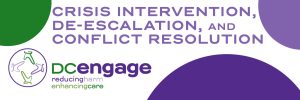Audience: Providers
Crossing The Threshold: Navigating The Gateway To SUD Treatment Spaces
This insightful webinar will guide you through the crucial steps in accessing substance use disorder (SUD) treatment spaces.
Bridging Care Outreach and Secondary Exchange
This webinar seamlessly combines theory and practice to empower participants with the essentials of outreach and secondary exchange.
Social Justice/Language Justice Implications for Services and Retention in Care
This group discussion focuses on social justice and retention in care.
Drug User Health in a Syndemic Environment – Strategies, Priorities, and Outcomes
These group discussions focus on drug user health in a syndemic environment.
Self Care Discussion with DC Engage Micro-Grantees
DC Engage’s annual Harm Reduction Conference brings together harm reductionists, community members, and experts to discuss the latest practices, techniques, and important issues in the harm reduction community.
Harnessing the Fury: Overcoming Barriers, Unveiling Pathways, and Minimizing Harm
Dive into a discourse centered on the policy limitations impeding the implementation of comprehensive HIV prevention programs for injection drug users. Uncover the pivotal role of policy change as a linchpin of public health action. Explore the transformative potential of research-driven insights and harm reduction approaches in minimizing the deleterious effects of HIV within this marginalized community.
All four 2023 Harm Reduction Conference training sessions must be taken to receive a total of 3.25 credit hours.
Drug User Health in a Syndemic Environment
This session addresses challenges related to living and accessing services in a syndemic environment. It covers those strategies that ensure individuals are able to address co-morbidities.
All four 2023 Harm Reduction Conference training sessions must be taken to receive a total of 3.25 credit hours.
Social Justice/Language Justice
This plenary focuses on how to eliminate and replace stigmatizing language and negative bias while also using person-first language within communities of people who struggle with substance use disorder to increase access to services and successful retention in care.
National Perspectives on Harm Reduction and Community Health
This session describes the impact of drug use from a national and local perspective, examines the social impact of drug use on communities, and identifies national and local harm reduction activities. Surveillance data will be presented to highlight national and local trends.

Crisis Intervention, De-escalation, and Conflict Resolution
This webinar will enhance the understanding of positive and negative forms of de-escalation, conflict resolution, and crisis intervention strategies for purposes of reinforcing community-focused harm reduction strategies.
